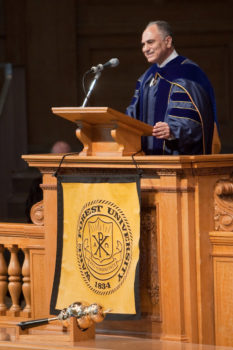Weathering Wake: Parent recalls African-Americans' experiences
Tracing the history of African-American faculty and students and the challenges they faced and overcame, Professor of History Anthony Parent delivered the address at Founders’ Day Convocation on Feb. 26.

Anthony Parent
Students, faculty, staff and alumni gathered in Wait Chapel to mark the 175th anniversary of Wake Forest’s founding in 1834. President Nathan O. Hatch presented the University’s highest award for service, the Medallion of Merit, to life trustee Marvin D. Gentry (’57) and Dr. Richard H. Dean, president emeritus of Wake Forest University Health Sciences. Several annual teaching and research awards were also presented.
In his address, “Weathering Wake: The African-American Experience,” Parent noted the efforts of white students in the early 1960s to integrate the student body, which led to the enrollment of Ghana native Edward Reynolds in 1962. From there, he shared the personal stories of a number of African-Americans students.
Parent’s speech:
Many of the first were athletes, he noted. Wake Forest was the first college in the ACC to integrate its football program, in 1964. Freddie Summers became the first black quarterback at a historically white Southern college in 1967; Audley Bell, a Jamaican, became the first black tennis player in the ACC in 1969.
It wasn’t until the 1970s that a more concerted effort was made to attract non-athlete African-Americans, he said. The first black faculty member wasn’t hired until 1969, and it would be another five years before the first black tenure-track professors, Herman Eure (Ph.D. ’74) and Dolly McPherson, were hired. The University reached a “milestone,” he said, in the hiring of Maya Angelou in 1982 as Reynolds Professor of American Studies. Parent joined the faculty in 1989; his son, Fred, is now a senior.
The small number of African-American students in the 1970s and 1980s formed a tight bond, he said, and they remembered the “safe havens” created by black faculty members, as well as black housekeepers and cafeteria workers. “This community atmosphere helped them succeed through a difficult, at times even hostile, experience,” he said. “They reckoned that successful African-American students were self-starters who weathered their experience.”
Parent recounted the painful memories of racism that some African-American alumni had shared with him, including the story of one professor in the 1960s who wouldn’t give a student an A because “a B was a good grade for a Negro.” He also recalled the controversy over the flying of a Confederate flag at a fraternity house on campus in the 1980s and the controversy that erupted in the 1990s when black Homecoming Kings and Queens were elected for twelve consecutive years.
But, he said, the University has made efforts throughout the last 20 years to increase the recruitment of African-American students and faculty, and to add scholarship programs and support services. Since 2002, nine African-Americans have joined the faculty, and Blake Morant was hired as dean of the School of Law, the first African-American dean, he noted. Omari Simmons (’96) became the first African-American undergraduate to become a faculty member when he joined the law faculty.
Noting the successful careers that many African-American alumni have gone on to achieve in various fields, he ended with an Honor Roll listing of a “Baker’s Dozen” of them: from Skip Brown (’77, MBA ’86) in banking, to George Perkins (’85) with the MD Anderson Cancer Center, to Sylvia Rousseau (’68), former superintendent of the Los Angeles Unified School District.
“We are all enriched by the contributions of African-Americans to Wake Forest, and African-American students, alumni, faculty and staff are proud of their association with the University,” he said.
Categories: Happening at Wake, Research & Discovery
Wake Forest News
336.758.5237
media@wfu.edu
Meet the News Team
Headlines
Wake Forest in the News
Wake Forest regularly appears in media outlets around the world.




